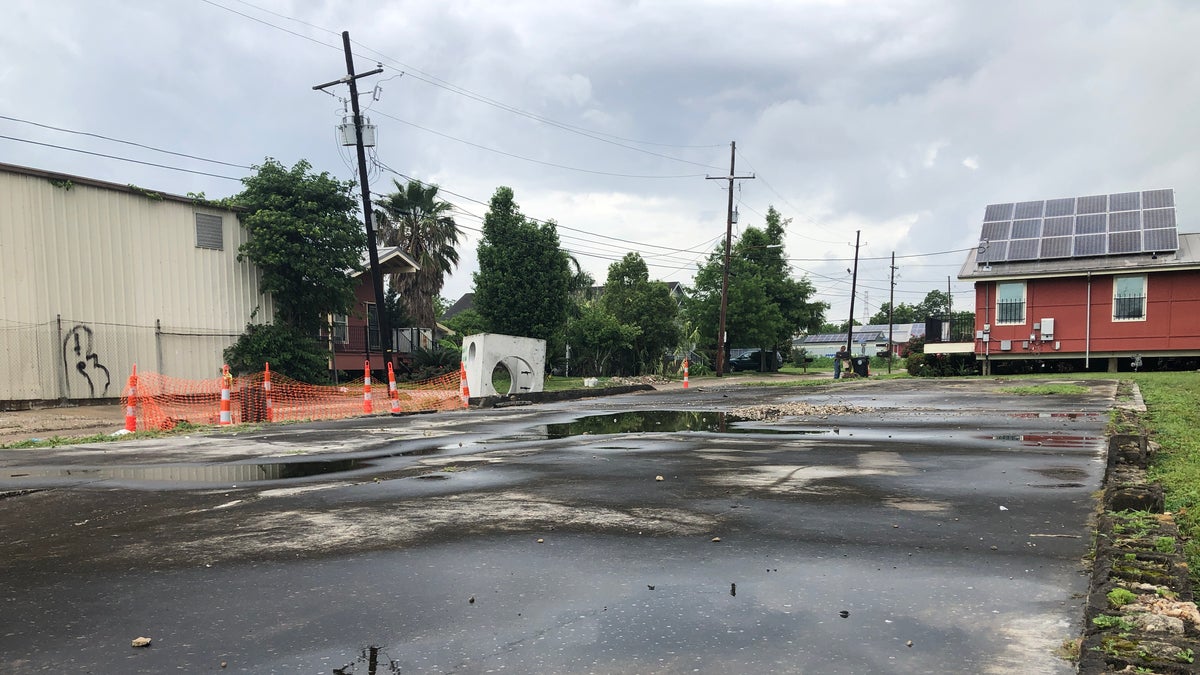New Orleans' Lower Ninth Ward in battle with coronavirus
Reident's of New Orleans' Lower Ninth Ward fear racial disparities brought on by the coronavirus could undo what progress they've made since Hurricane Katrina destroyed their community nearly 15 years ago.
NEW ORLEANS, La. - Nearly 15 years after Hurricane Katrina destroyed New Orleans’ Lower Ninth Ward, residents are still trying to restore the community back to what it once was. There’s been progress, but the spread of the coronavirus could undo it all.
Burnell Cotlon, the owner of Burnell’s Lower 9th Ward Market, said the virus has taken the community two steps backward. Cotlon has operated the only grocery in the Lower Ninth Ward since Hurricane Katrina tore the neighborhood apart in 2005. He’s is used to seeing people in the predominantly black neighborhood struggle financially, but the hardships brought on by the coronavirus have been tough—even for him to take in.
"If I had to compare COVID-19 to Hurricane Katrina, it’s a no-brainer. At least with a hurricane, you can pick your family up and leave because you have a warning. With this virus it’s impossible," he said. "It’s like they have the weight of the world on their shoulders. You’re dealing with Katrina. You’re dealing with the virus. And then it’s also a poor neighborhood."
Cotlon said customers have come into the store and have been reduced to tears after their debuts cards decline purchases they’ve tried to make. So, he’s just given away the food on his shelves—fruits, vegetables, bread—with a hug of support. This even as the global pandemic has forced him to confront hardships of his own.

Burnell Cotlon stocks shelves in 'Burnell's Lower 9th Ward Market.' He's had to give away food to people in the community who are struggling to make it through the coronavirus pandemic. (Fox News/Charles Watson)
"I’m a veteran. I used my VA loan to buy my house about seven blocks from here," he said. "I’ve been late a couple of times because I had to decide ‘do I close down or do I pay my mortgage?"
Black communities across the country have been among the hardest hit by the coronavirus. According to by amfAR, a nonprofit that focuses on AIDS studies, black people account for about 58 percent of deaths caused by the virus and more than half of the nation’s cases.
GOVERNORS FACE MOUNTING COURT CHALLENGES OVER CORONAVIRUS LOCKDOWNS
The racial disparities have shown up in New Orleans neighborhoods. According to census tract data from the Louisiana Department of Health, more than 90 percent of predominantly black neighborhoods in the city have infections between 1-3 percent. The numbers drop dramatically in majority-white neighborhoods; 16 percent of people in those communities had similar infection rates.

The Lower Ninth Ward is still in a state of recovery 15 years after Hurricane Katrina destroyed the community. Residents fear what progress they've made, could be erased by the coronavirus.
Thomas LaVeist, dean of Tulane University’s School of Public Health and Tropical Medicine, said the accelerated spread in poorer black communities was alarming but not surprising. He said people in those neighborhoods were more likely to work in the service industry and live in close quarters giving the virus ample opportunity to spread.
"People have less ability to have the finances to mitigate something like this. Less likely to have jobs to work from home on zoom and still collect their entire salary," he said.
STATE AND LOCAL OFFICIALS SPAR ON REOPENING MEASURES AMID CORONAVIRUS PANDEMIC
LaVeist, who also serves on coronavirus task forces for both Louisiana Governor Jon Bel Edwards and New Orleans Mayor Latoya Cantrell, said state and local leaders need to prioritize vulnerable communities as decisions to reopen economies are decided. Educating minority communities is also of great importance, he said.
Tulane University is launching an educational outreach program entitled "The Skin You’re In." It’s aimed at targeting black communities such as the Lower Ninth Ward and teaching people about the risks the coronavirus has posed. LaVeist said the hope is people walk away with three tools to mitigate the spread of the coronavirus: hand washing, personal distance and the importance of wearing a mask.
CORONAVIRUS: WHAT YOU NEED TO KNOW
"We don’t have a medical response. All we have is public health education," he said. "We have to motivate people to do the right thing."
For now, Cotlon has been doing whatever he needed to do to make sure people in the Lower Ninth Ward have been protected. He’s stocked up on N95 face masks and hand sanitizer so people won’t have to take three buses to the nearest big box store. He’s also working to open up an Internet café behind his grocery store so the community has all the resources they need to succeed when schools and businesses resume.
CLICK HERE TO DOWNLOAD THE FOX NEWS APP
They’ve got a fight on their hands with the virus, but Cotlon said he’s determined to get his people over this most recent hurdle.
"I can’t stop and I’m not going to stop," he said. "I’m just an average guy, but I got above average dreams of seeing the Lower Ninth Ward catch up with the rest of the city."


